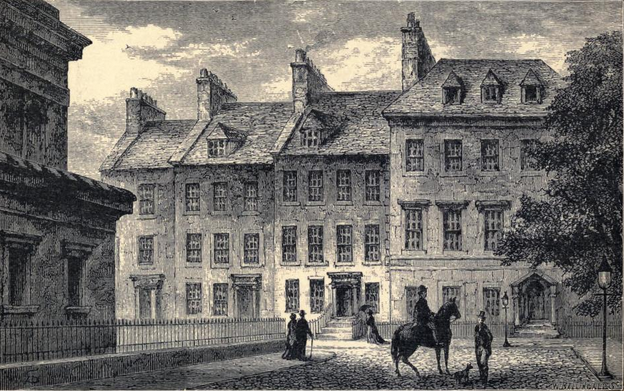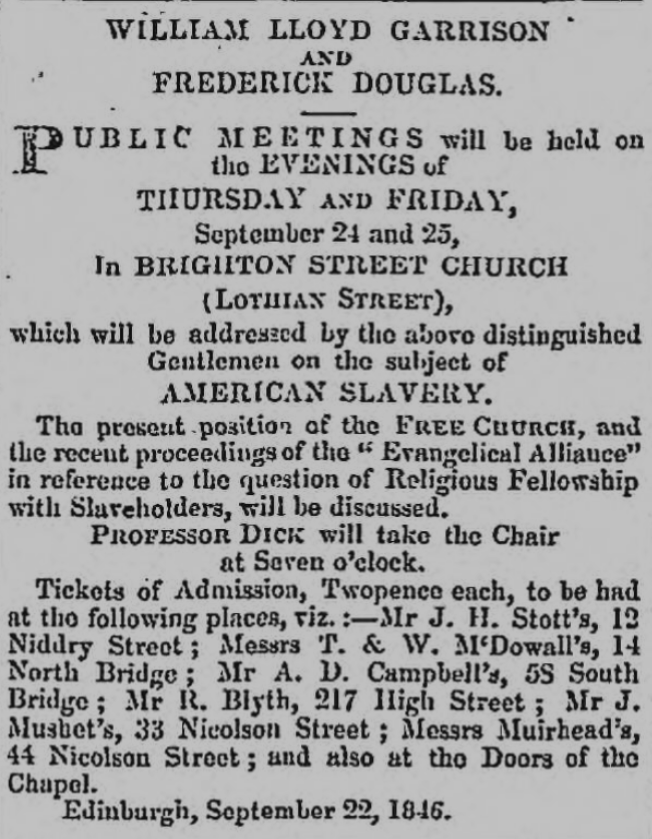
After their success in Paisley, Frederick Douglass and William Lloyd Garrison proceeded to Edinburgh. They were introduced to the committee of the Scottish Anti-Slavery Society at the home of its secretary, Rev. James Robertson, at 33 Gilmore Place.1 Today a plaque marks Douglass’ visit. That evening they addressed the first of two meetings at Brighton Street Church.

The last time Douglass was in Edinburgh, at the end of July, Robertson had persuaded him to serve as the Society’s agent. However, Douglass would soon head south and during August was involved in the formation of another abolitionist body, The Anti-Slavery League, which held its inaugural meeting in London. Both organisations were defunct within a year.
Of this first Edinburgh meeting, Garrison wrote:
The audience was considerably numerous, but not crowded, but will probably be much larger this evening. I gave a brief history of the American Anti-Slavery Society, and vindicated it and myself from the slanders which had been brought against it; and then proceeded to criminate and rebuke the Free Church, with special allusions to Chalmers, Candlish, and Cunningham. Frederick took up the Evangelical Alliance, and, as we say in America, ‘handled it without mittens.’ The applause was frequent and hearty, though there were a few serpents in the assembly who hissed. An invitation was given to any one to come forward, and defend either the Free Church of the Alliance, but no one ventured to enter the lists.2
For an overview of Douglass’s activities in Edinburgh during the year, see Spotlight: Edinburgh.
AMERICAN SLAVERY
On Thursday night, a public meeting was held in Brighton Street Church, to hear Mr L. Garrison and Mr F. Douglass on the position of the Free Church and the Evangelical Alliance, in reference to the question of Christian fellowship with slaveholders.
The chair was occupied by Professor Dick. After the chairman had shortly addressed the meting, the Rev. James Robertson read a testimonial from the free coloured population of Boston in favour of Mr Garrison, expressing their confidence in him, their wishes for his success and prosperity in his present mission in this country, and commending him to the kind reception of George Thompson and other gentlemen in this country favourable to the abolition of American slavery.
The meeting was then addressed at great length by Mr Garrison. He vindicated the abolitionists from the grave charge brought against them by Dr Cunningham, of being disturbers of the public peace and instigators of the slaves to cut their masters’ throats. He traced the rise, progress, and disunion of the Anti-Slavery Society in America. He maintained that the Abolition party, to which he belonged, were the best friends of the slave, as was proved by the fact, that the slaves themselves looked up to them with entire confidence as their best benefactors. He referred to the charge of infidelity that had often been brought against the friends of immediate and complete abolition of slavery, and said he gloried in being regarded as an infidel in the sense in which it was thus applied, as the same charge had been preferred against good men in every age, and even against Christ himself. He lamented the somewhat altered tone of public opinion in respect to slavery, which was prevailing at present in this country, from what it was on his last visit. He attributed this to the conduct of a few leaders of the Free Church, whom he declared to be her enemies rather than her friends. He assailed the Free Church deputation for their unfaithfulness when in America, and declared, if the money which they then got from the slaveholders was not sent back, all the true friends of freedom would abandon her to her fate.
Mr F. DOUGLASS then addressed the meeting. He commented severely upon the conduct of the Evangelical Alliance, and said it had committed a grievous injury to the cause of slavery. He animadverted particularly upon the course pursued by such men as Dr Wardlaw, Dr Hinton, and Mr J. Angell James, in voting for the withdrawal of the whole question at the alliance.
Scotsman, 26 September 1846 ; reprinted in Caledonian Mercury, 28 September 1846
Notes
- James Robertson to Edmund Quincy, Glasgow, [2?] October 1846, reprinted in Liberator, 30 October 1846.
- William Lloyd Garrison to Richard D. Webb, Edinburgh, 25 September 1846, reprinted in The Letters of William Lloyd Garrison. Volume 3: No Union with Slave-Holders, edited by Walter M. Merrill (Cambridge: Belknap Press of Harvard University Press, 1973), p. 428.